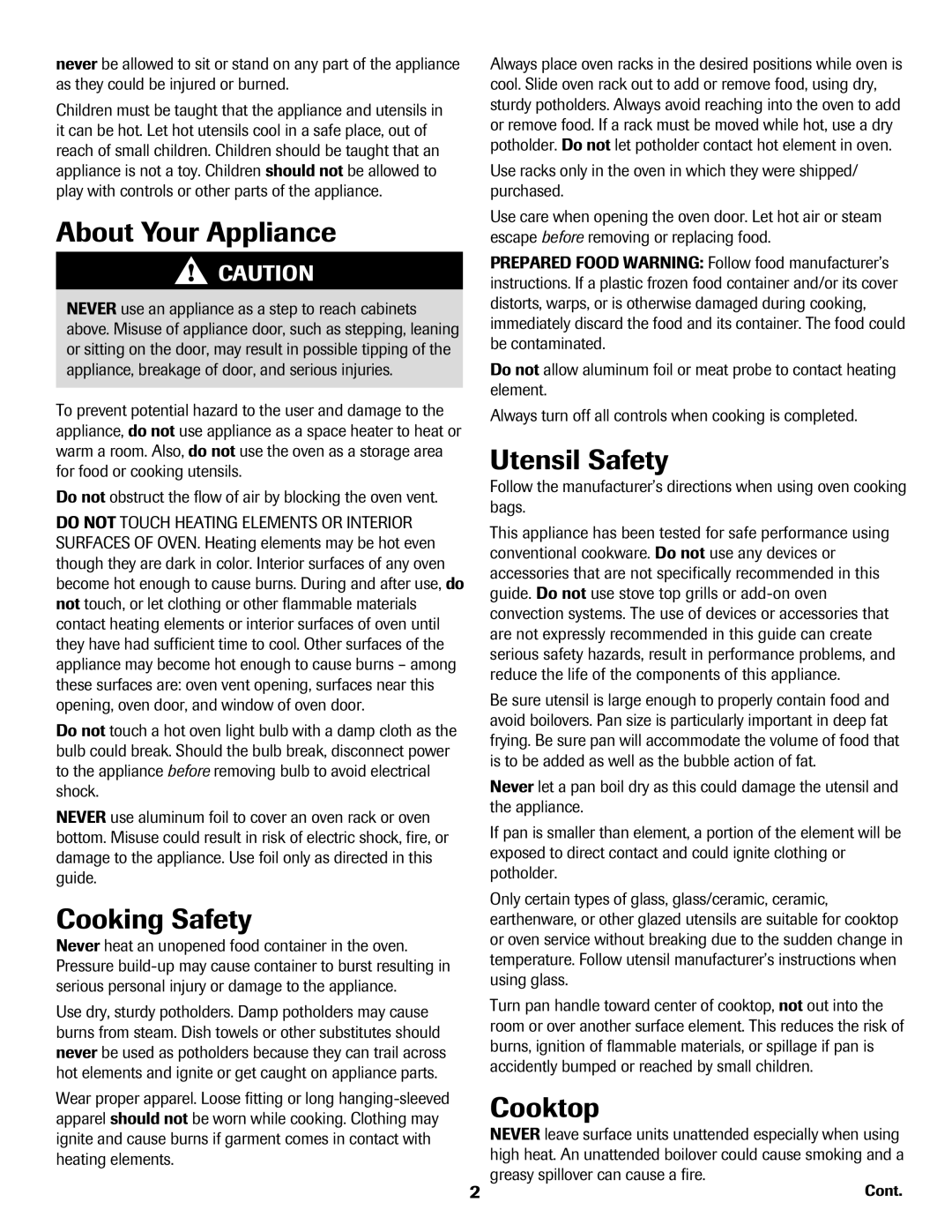
never be allowed to sit or stand on any part of the appliance as they could be injured or burned.
Children must be taught that the appliance and utensils in it can be hot. Let hot utensils cool in a safe place, out of reach of small children. Children should be taught that an appliance is not a toy. Children should not be allowed to play with controls or other parts of the appliance.
About Your Appliance
![]() CAUTION
CAUTION
NEVER use an appliance as a step to reach cabinets above. Misuse of appliance door, such as stepping, leaning or sitting on the door, may result in possible tipping of the appliance, breakage of door, and serious injuries.
To prevent potential hazard to the user and damage to the appliance, do not use appliance as a space heater to heat or warm a room. Also, do not use the oven as a storage area for food or cooking utensils.
Do not obstruct the flow of air by blocking the oven vent.
DO NOT TOUCH HEATING ELEMENTS OR INTERIOR SURFACES OF OVEN. Heating elements may be hot even though they are dark in color. Interior surfaces of any oven become hot enough to cause burns. During and after use, do not touch, or let clothing or other flammable materials contact heating elements or interior surfaces of oven until they have had sufficient time to cool. Other surfaces of the appliance may become hot enough to cause burns – among these surfaces are: oven vent opening, surfaces near this opening, oven door, and window of oven door.
Do not touch a hot oven light bulb with a damp cloth as the bulb could break. Should the bulb break, disconnect power to the appliance before removing bulb to avoid electrical shock.
NEVER use aluminum foil to cover an oven rack or oven bottom. Misuse could result in risk of electric shock, fire, or damage to the appliance. Use foil only as directed in this guide.
Cooking Safety
Never heat an unopened food container in the oven. Pressure
Use dry, sturdy potholders. Damp potholders may cause burns from steam. Dish towels or other substitutes should never be used as potholders because they can trail across hot elements and ignite or get caught on appliance parts.
Wear proper apparel. Loose fitting or long
Always place oven racks in the desired positions while oven is cool. Slide oven rack out to add or remove food, using dry, sturdy potholders. Always avoid reaching into the oven to add or remove food. If a rack must be moved while hot, use a dry potholder. Do not let potholder contact hot element in oven.
Use racks only in the oven in which they were shipped/ purchased.
Use care when opening the oven door. Let hot air or steam escape before removing or replacing food.
PREPARED FOOD WARNING: Follow food manufacturer’s instructions. If a plastic frozen food container and/or its cover distorts, warps, or is otherwise damaged during cooking, immediately discard the food and its container. The food could be contaminated.
Do not allow aluminum foil or meat probe to contact heating element.
Always turn off all controls when cooking is completed.
Utensil Safety
Follow the manufacturer’s directions when using oven cooking bags.
This appliance has been tested for safe performance using conventional cookware. Do not use any devices or accessories that are not specifically recommended in this guide. Do not use stove top grills or
Be sure utensil is large enough to properly contain food and avoid boilovers. Pan size is particularly important in deep fat frying. Be sure pan will accommodate the volume of food that is to be added as well as the bubble action of fat.
Never let a pan boil dry as this could damage the utensil and the appliance.
If pan is smaller than element, a portion of the element will be exposed to direct contact and could ignite clothing or potholder.
Only certain types of glass, glass/ceramic, ceramic, earthenware, or other glazed utensils are suitable for cooktop or oven service without breaking due to the sudden change in temperature. Follow utensil manufacturer’s instructions when using glass.
Turn pan handle toward center of cooktop, not out into the room or over another surface element. This reduces the risk of burns, ignition of flammable materials, or spillage if pan is accidently bumped or reached by small children.
Cooktop
NEVER leave surface units unattended especially when using high heat. An unattended boilover could cause smoking and a greasy spillover can cause a fire.
2 | Cont. |
